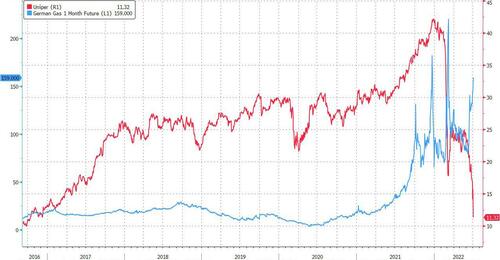German Energy Giant In Talks Over €9 Billion Bailout Package
Remember when Germans laughed at Donald Trump in 2018 for saying they had become “totally dependent” on Russian energy? Well… yhey aren’t laughing now.
Just a few days after we reported that the stock of German gas and power utility Uniper – and the single largest importer of Russian gas in Germany – crashed after the company slashed its outlook and said it was in talks with the government to secure liquidity, potentially including a full-blown bailout from the German government after Russia reduced natural gas deliveries to Europe, on Monday Bloomberg reports that the giant utility is in advanced talks with the German government over a bailout package of as much as 9 billion euros, (or $9.4 billion).
The government is looking at applying a set of measures, including loans, taking an equity stake and also passing part of the surge in costs onto customers, said two people familiar with the talks.
As part of the plan, Reuters reported earlier that Germany’s government is preparing legislation that will allow it to take stakes in utilities and impose emergency levies on consumers as ministers are scrambling to deal with the impact of soaring energy prices on electricity firms after Russia’s invasion of Ukraine, with Economy Minister Robert Habeck recently warning of “a Lehman effect” as suppliers face soaring costs to meet obligations to customers. The new law will also allow for customers to shoulder more of the burden of rising gas prices. The cabinet is set to approve the bill this week.
Uniper shares sank another 28% on Monday, taking the company’s market value to 4.14 billion euros, just shy of its all time low. The stock was worth roughly 4x more at the start of the year.
Germany, which has built its economic model on a cheap common currency (which has crushed Europe’s periphery ) to avoid the strong Deutsche mark, and even cheaper Russian gas, is wrestling with a squeeze in supplies and surging fuel prices as Moscow punishes Europe for its support for Ukraine. German Economy Minister Robert Habeck has warned the gas crunch risks triggering a collapse in the market, similar to the role of Lehman Brothers in the financial crisis. The surge in energy import prices has crushed Germany’s exporting powerhouse, sending its trade balance plummeting and as shown in the chart below at this rate Germany faces an unprecedented outcome: a negative trade balance, something that has not happened since the early 1990s.
German utilities have been urging the government to impose a levy on consumers to help offset the rising cost of gas. Analysts estimate that curbed Russian flows are costing Uniper 30 million euros a day.
Meanwhile, Habeck has said that the squeeze on Russian flows may get worse, and warned of the risk of a domino effect of failing companies. The broader economy is also in peril as the government is trying to contain the fallout for consumers and industry. Plans have been drafted for rationing, with Germany’s vast industry poised to suffer shortages.
“We aren’t dealing with erratic decisions but with economic warfare, completely rational and very clear,” Habeck said on Saturday. “After a 60% reduction, the next one logically follows.”
Well, maybe if it is all “rational and very clear”, then Germany should not have sided with Ukraine in the all too real war taking place just a few hundred miles east of Germany.
So just how will Germany add another company to its bailout roster? According to Bloomberg, Chancellor Olaf Scholz signaled at the weekend the government could use bailout tools created during the pandemic to rescue Lufthansa in the current crisis.
“The federal government should be given options along the lines of the Lufthansa aid,” a Reuters source said.
Lufthansa’s bailout saw the state taking a 20% stake in the airline through an Economic Stabilization Fund, but without being able to exercise shareholder voting rights. The airline was not allowed to take over other companies until 75% of the state aid had been repaid, and its shareholders and managers could not benefit from taxpayers’ money, meaning dividends and bonus payments were put on hold.
Decades after de-regulating their energy markets, governments across Europe are intervening to prop up utility companies buckling under sky-high prices, while also protecting consumers from soaring costs. Several European energy suppliers have gone bust over the past year, where they have had long-term contracts with customers and have been unable to pass on the swift spike in prices.
To try to shield consumers from soaring energy bills, governments have also turned to windfall taxes on oil and gas companies, subsidies and discounts.
Russia is Germany’s top supplier of gas, making it more exposed than other European states to an economic war with Moscow. Soaring prices have heaped political pressure on Chancellor Olaf Scholz, who on Monday will meet unions and employers to try to build a consensus on fighting inflation, reviving a concept established in 1967 in response to economic recession that ended the country’s post-war boom.
Meanwhile, Germany’s government has warned of possible energy shortages and rationing in the winter months if it cannot fill its gas storage quickly enough.
“The hope of filling the gas storage facilities to some extent by winter could be torpedoed by Russia at any time. Then there are hardly any compensatory possibilities left,” said a note from Sentix that tracks investor morale in the euro zone.
“In Germany, some ideological boundaries have to be crossed to prevent a “Lehman moment” in the energy sector,” it said, referencing the U.S. bank whose demise help triggered the 2008 financial crisis.
Tyler Durden
Mon, 07/04/2022 – 16:00

